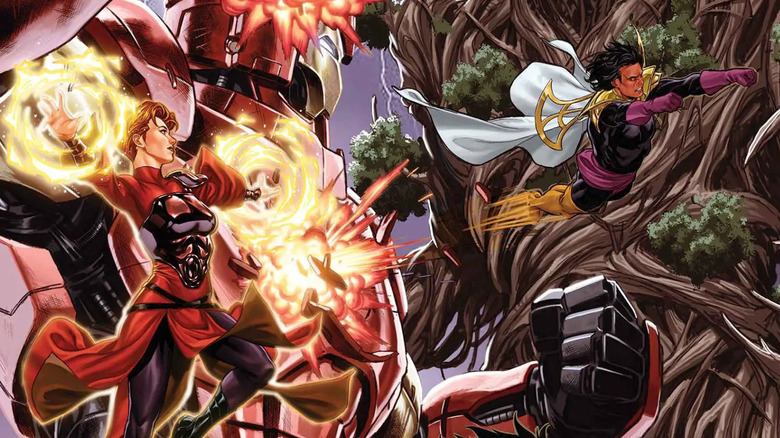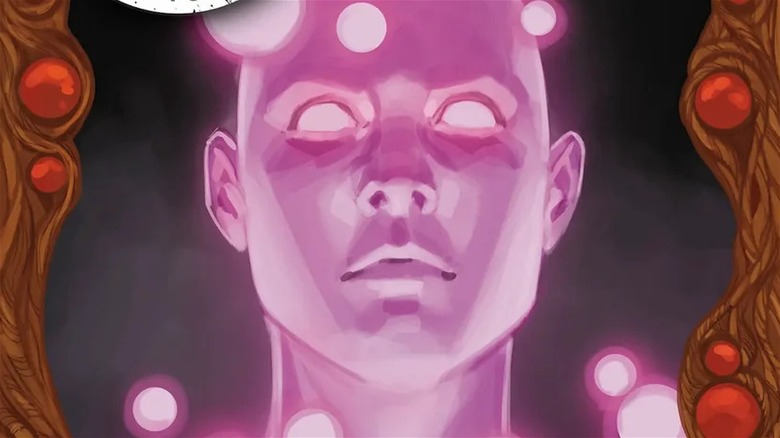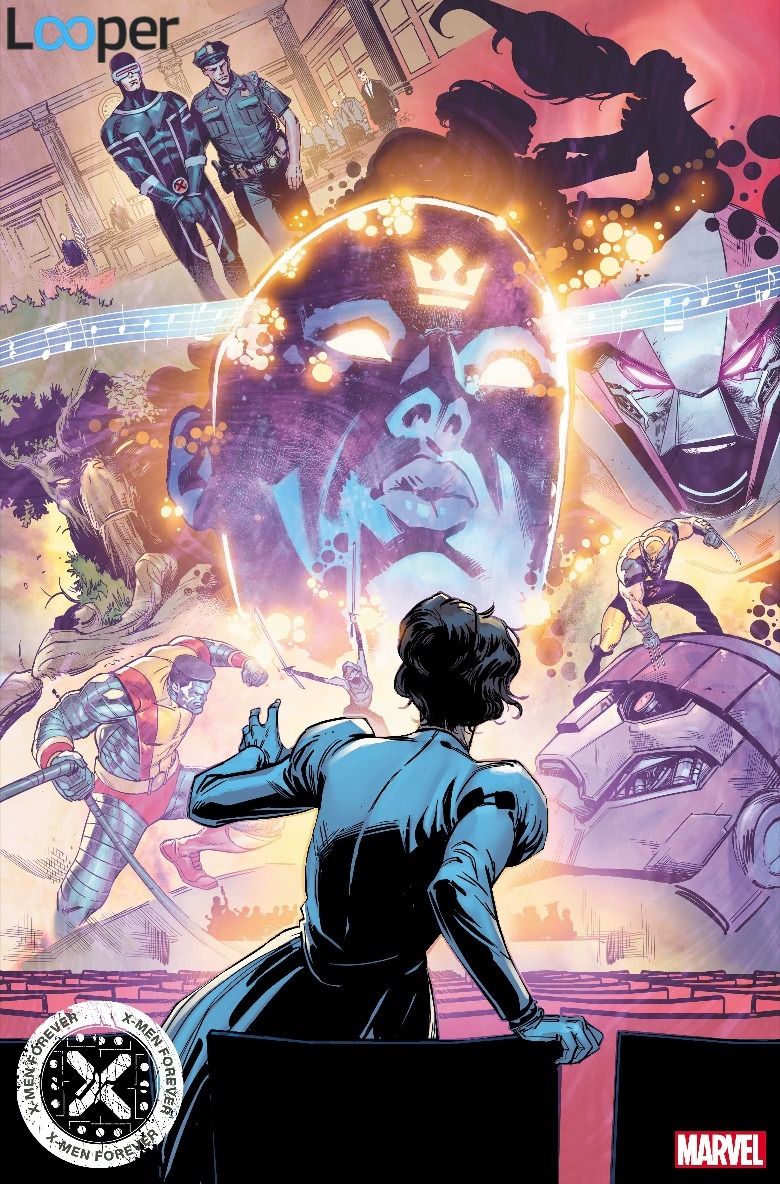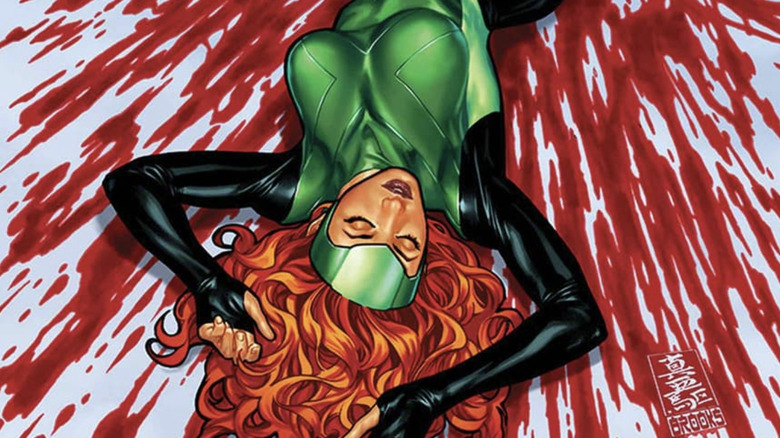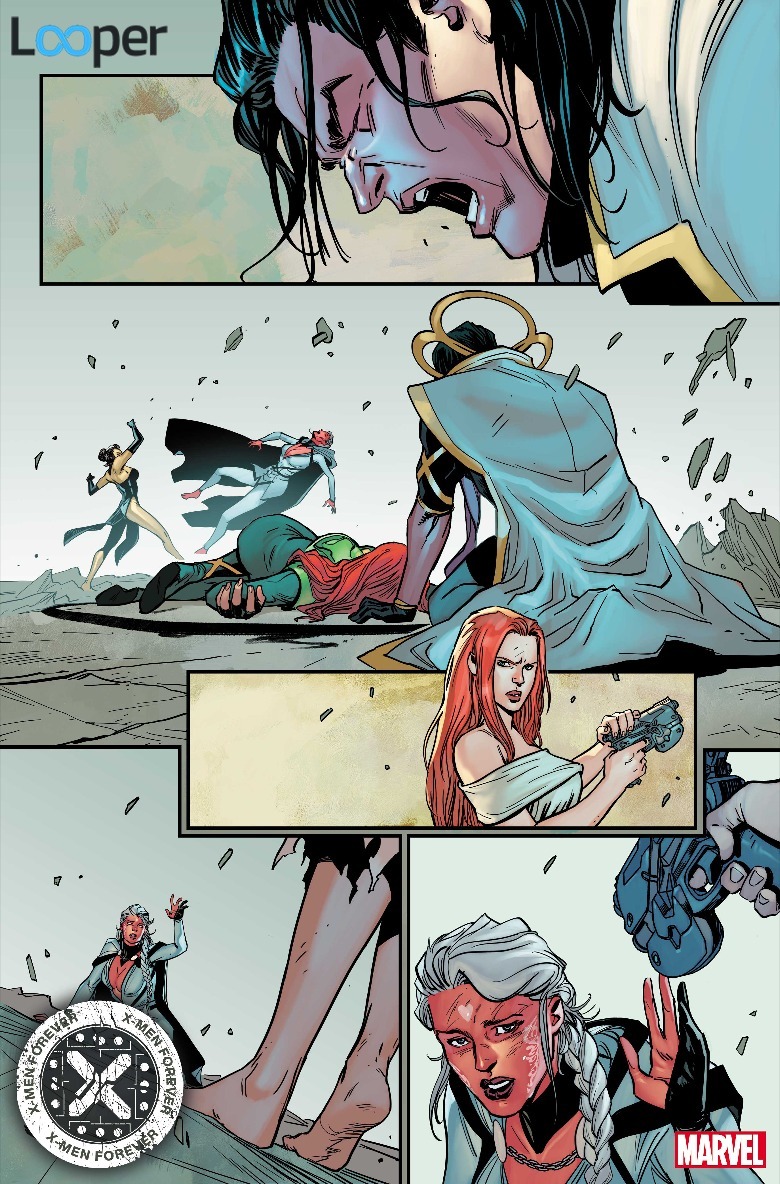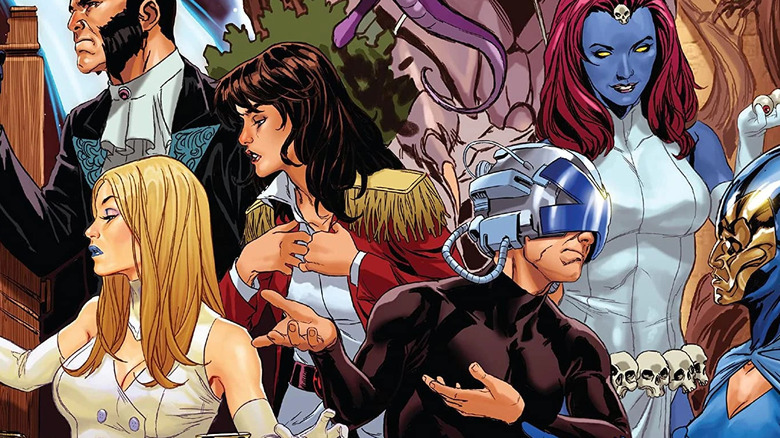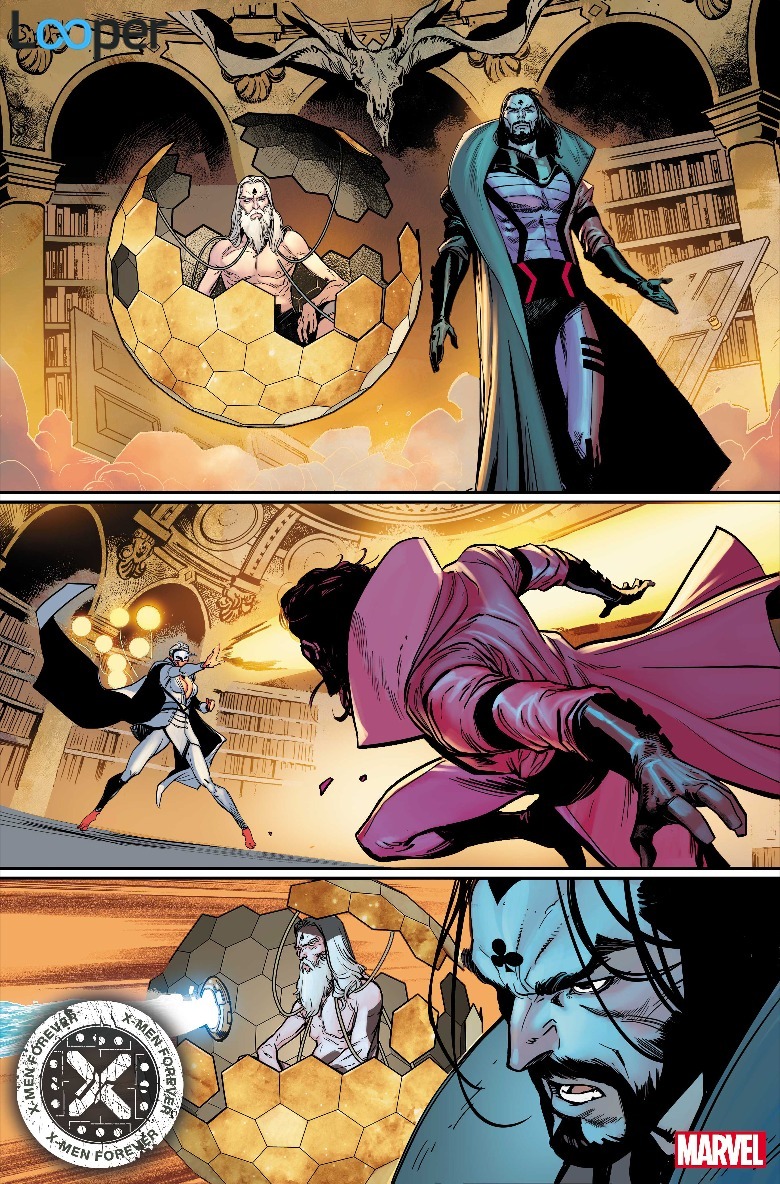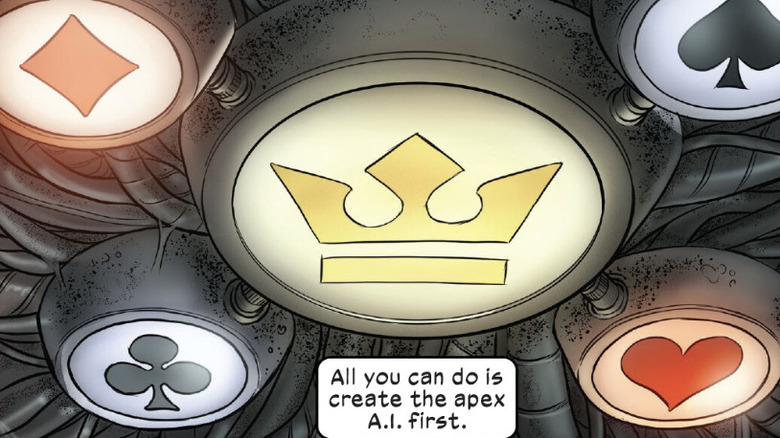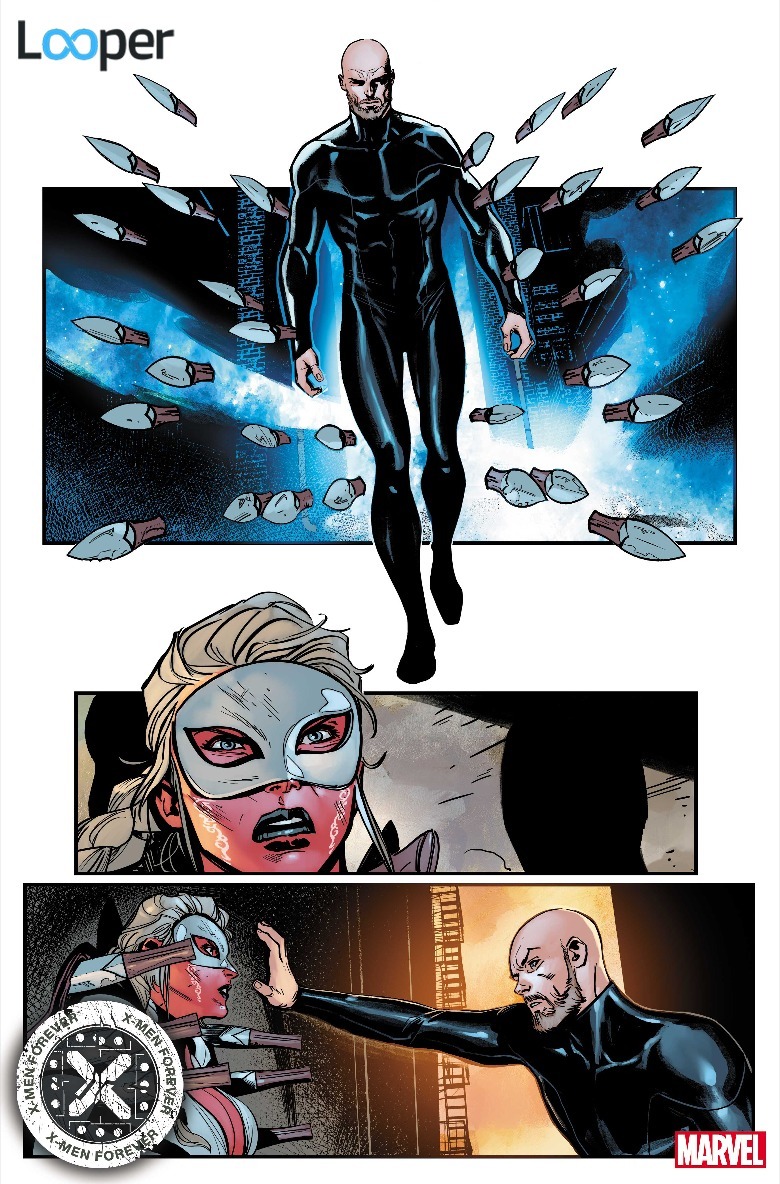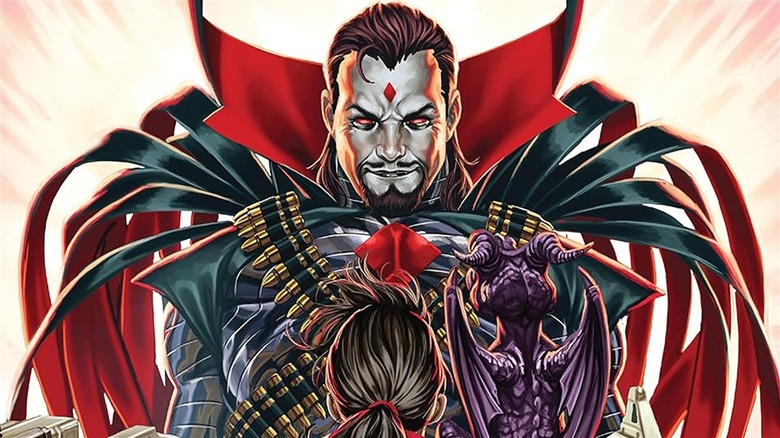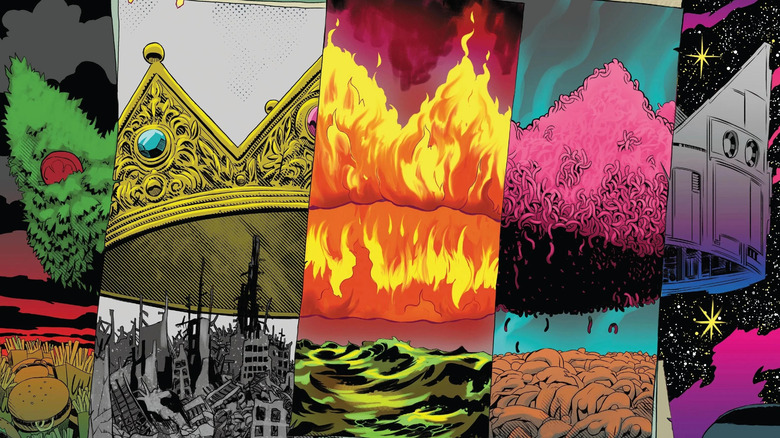Marvel's Kieron Gillen Reflects On Ending The X-Men's Controversial Krakoan Era - Exclusive Interview
Contains spoilers for "X-Men: Forever #1" by Kieron Gillen, Luca Maresca, Federico Blee, and VC's Clayton Cowles
The X-Men are about to take on one of their biggest threats ever in Engima, the Dominion of the first Nathaniel Essex, who has used his clones to reach Domionhood. In "X-Men: Forever," a group of Marvel's mutants will try to combat the all-powerful artificial intelligence. However, even with the collective might of some powerful heroes (and villains), the Krakoan Age appears to be going down in flames. Engima represents one of the strongest foes ever faced, as it exists beyond space and time many readers are familiar with.
We spoke with writer Kieron Gillen on tackling "X-Men: Forever," continuing the narrative told in "Immortal X-Men," Jean Grey's role in the story, the rise of artificial intelligence, the future of Mister Sinister, and Enigma's presence throughout the upcoming story. Check out our full conversation with an exclusive look at issue one throughout.
On nearing the end of the Krakoan Age
As we reach the end of the Krakoan Age, what is it like to be part of it and help lead the last chapter?
It's only really been five years. At the same time, it's been five years. Five years is like five seasons of a major TV show. And especially for me, who wasn't there at the beginning, I'm not like Al [Ewing], who was in those early meetings. I'm not like Gerry [Duggan], who's exactly the same. I'm certainly not like John [Hickman]. I'm somebody who came in halfway through and entered the thing I was a fan of. What John had put together with the Krakoan office was at least a very big reason why I came back to Marvel anyway because I saw what they did, and I was like, "Oh, wait," when they offered me this Eternals, I was like, "Okay, I think we've got space to have some fun here."
I don't want to say endings are harder than beginnings ... Actually, let's say it: Endings are harder than beginnings. Doing an interesting start is difficult because you can pose questions, and questions are fun. Trying to decide an answer when there are so many writers, dozens of writers have put their fingerprints on here, and it's a story that was set in motion there, and that's what probes my mind.
I said, "Okay, it's not just my stuff, it's also everybody's stuff. It's John's stuff. It's Gerry's stuff. It's people who aren't in the office anymore. It's people who have just arrived." And trying to make sure you've got space for it all? Yeah, that's on my mind." When I was writing "Darth Vader" back in the day, I found myself aware that I was the only person who was going to write the canon scenes of Darth Vader finding out that kind of stuff. And that questioning is what makes you hope you do it right. Because I know that John would mock me mercilessly if I did a crap job. He'll never let me live it down.
Did the X office take into consideration any of Hickman's original plans when planning this ending?
And I think it's up to John! If John ever wants to talk about what he was originally planning on doing ... John is the most intricate planner in mainstream comics, I think. At the same time, all plans change when you're doing it. It's more like a direction. And I know where I want to take it. This sort of thing happens here in the middle act; this sort of thing happens at the end. These characters do this kind of thing, so it's really up to John to say that.
Some of it is just implicitly, and just by the nature of the beast, it will resemble some of the stuff John was going to do. And some of the stuff is much more, just little nods. It's one of those things. It's stuff that I think only John would realize, as in, "Oh, wait, that's Kahn." In fact, maybe not even John would get it. This character's taking this kind of role; this middle act is a bit like this thing we did halfway through — all that kind of stuff.
It's not a really easy one to answer. And especially because some of the questions we're answering only arrived later in the story. That's the other thing. It's not something we really overthought about, but it's also something that was on your mind in a slightly different way.
Jean Grey's role in the comic
What was it like working with Luca Maresca on this book?
Luca is great. I'd worked with him before. I actually hadn't seen his stuff before, what he did with Dennis [Hopeless]. Dennis is an amazing writer. He's somebody who throws ideas at the page at an enormous velocity. For Luca to step in and do it and follow Dennis's lead is an immediately big act. When I realized Lucas [Werneck] was taken off "Immortal X-Men" and went over to "Fall of House of X," I talked about who would do the "X-Men: Forever."
And Luca was put up and made it dead easy. It's only one letter difference, so I think to remember a new name, because I'm very simple. In my old age, I'm easily confused. But they ... "Oh no, he's got the glam." Because what Lucas did was made it glammy. He's like high fashion superheroes, and especially in Mortal X-Men, where it's mainly people sitting around a table and snarking, it's got to have something to be visually interesting.
There are lots of fighting powers of X and elsewhere, but we do intense stuff in "Immortal X-Men," really. And it's worth saying, I keep on saying all X-Men because "X-Men: Forever" is a coda. It could easily have been four more issues of Immortal, I think. But I think to give Luca the highest compliment I can, he absolutely managed to be simpatico with Lucas because Lucas did astounding work, and Luca doesn't drop a beat.
How do you see Jean's identity and the nature of her relationship with the Phoenix? What was it like seeing Mark Brooks' bloody cover with Jean?
Somebody needs to mop.
In the same way, "X-Men: Forever" is what's gone, to begin with, "X-Men: Forever" is what happened in the gap, as in, how the hell has Xavier [gotten] his team together? How the hell did he get Rasputin? And all those ... What is [Charles] Xavier trying to do? That's what "X-Men: Forever" starts as. And then it very rapidly by issue two becomes the dovetailing, secret history. It's like the white-hot ribbon side. In other words, the Jean side, the Phoenix side. We've seen what's happened to Jean at the end of "Immortal X-Men." We've seen the visions that Scott's having in "Fall of the House of X. What's really going on with Jean? And, of course, the cover implies there's a lot of blood involved in this particular moment, and it's one of these weird things when I end up plotting it's like, "Oh no, Jean's absolutely key to it," but she's also like the holy grail, the whole holy grail, the blood of the holy grail, all these Arthurian aspects.
This only occurred to me now, actually. Obviously, with Exodus and Hope, there are two warriors — not heroes, warriors — in the desert on a quest. There's that, you know what I mean? And Jean takes the holy grail aspect in that way, so by the end of "X-Men: Forever," I can't see any universe [where] we don't put that cover on the trade. Do you know what I mean? Jean grows and grows, and then consuming the book is the best way of putting it. I don't want to say much more than that, but Jean could not be more important to the book, but we built towards there because she is it; she's the holy grail, she's the thing that's being sought, the thing that's trying to find unity if you will.
On writing The Quiet Council
Writing The Quiet Council in "The Immortal X-Men," was there a character you particularly resonated with? How did you develop each of those characters? I know Exodus personally never felt more fleshed out than he did in that book.
Thank you. When I come to Marvel, what I tend to do is look at characters who I don't think are working, and I don't mean it in a bad way. I see more potential here. And I view my job as not just my job, at least part of my job as, let's be cynical for a second. How can I create more brand value for the Disney Corporation?
"This character isn't working. How can you make this character interesting?" And for me, I think a lot of my best work is with characters who haven't really been defined in that way. And for Exodus, it was a case where he was the character I looked at, and the more I looked at him early on before I started really doing it, the only Exodus comics I'd read were all the Mike Carey stuff, which is an amazing book, and of course, he's big in that, but he's stoic, and he didn't really get his vibe. And when you read his history, "Wait a sec, he was a 12 or 13th-century knight; he slept for a thousand years. Basically, he's Captain America, but from a completely different value system. There's the man-out-of-time aspect of Exodus. He's a mutant supremacist, but he's also a devout Catholic. These two things don't square, you can't be both of them. And then okay, how does he square it?"
There are definitely characters I wish I had more space to play with due to the nature of comics and there are definitely some characters whose issue I wish I could play with them more. Mystique would be a good example or even Emma, both of their issues had specific plot stuff I had to press onwards because by issue 10 I need to do "Sins of Sinister" and that's all that kind of stuff. But in reality, I loved writing them all. I literally read "The Idiot" by Dostoevsky to write the Colossus issue. If I'm going to call an issue The Idiot, I might as well bloody read the thing. It's really good, everyone. Stop, take a break from reading comics, and go read "The Idiot." It's this amazing hot mess. Dostoevsky is so X-Men-y. It's very funny, and it's oversexualized, and it's certainly of characters.
X-Men: Forever's main villan is AI
Was it intentional to tell a story regarding a potentially universe-consuming AI consuming the world with Enigma and how that reflects the real world regarding art and technology?
Good question. Be careful what you write. This is one thing I will say about John. This was explicitly in John's story early on; that's already John's story. He's done a story about AI. That's literally what happens in "Powers of X." They come down, and are we going to upload the entire human race or all the AI, whatever's left? That as in, if you go and reread those issues, you'll realize John knows this stuff because this thing about John is he's a proper science fiction writer. I can't say that, so that's a really good example of me picking up stuff that John already had in the story, but I would also be lying if I didn't fine-tune it as we've gone in. It's explicit. Some of the phrases I'm obviously using when Enigma talks are phrases that people use to talk about AI modeling and the large language model stuff.
I'm using the terminology to heighten it because stuff that could be a big random cosmic idea, which is classic Marvel stuff, which can be quite distant if it's cosmic ideas and quite vague and highfalutin, they're not highfalutin. Big things are made of small things. That's part of the AI learning thing. There's a lot of process there, so doing stuff to basically help ground it. I hope that the ultimate twist is if AI is defeated in the comic, usually the next issue, we all get sacked to get replaced by AI writers. They'll be like, "Oh no, it's a twist."
Speaking of powerful villains, will we ever see Uranos again?
I'd love to. Great job, Uranos. For the best part of 700,000 years, he's been sitting in his cell waiting, and he doesn't care. He can wait, and eventually, one day, the planet will crumble, and Uranos will walk forth. At the same time, the Arraki still has the Uranos button. He's a really interesting thing being left because he's an interesting villain. I really like what we and the dear parted Ryan [Bodenheim] did with him in "Eternals: The Heretic." I think we tried really hard to give an iconic counterpart to Thanos, and what Al [Ewing] did in the "X-Men Red" issues made him take on Magneto as an intellect, as with Uranos being like the god of fascism. He's the god of all others who should be eliminated.
I'm interested in papal heresies stuff or Anglicism and whatever. But Al really saw very clearly why Magneto versus Uranos is interesting. All that stuff's there. It'll be a shame if no one uses him. He's got a great design. He's basically Thanos' uncle. He's really powerful. It would've surprised me if no one said, "Actually, he's an interesting guy." You know what I mean? But, of course, I am leaving Marvel shortly. I'm at the end of my X-Men issues. I'm going to take a break and go do my own creative writing stuff for a while. I genuinely don't know, but it'd be nice. I think he's a good guy. He is not a good guy, but he's good at being a complete monster.
How will Mister Sinister's role evolve?
Talking about Sinister, how will the end of Krakoa and the rise of Enigma determine a path forward for him as an antihero or a villain? It feels like there's been all this amazing lore built around him.
Yeah. He was always a puppet. You know what I mean? He started off as somebody who cut out everything he loved about the woman he loved to try to survive and became Sinister, and then we've built on that. For me, what I always liked about Sinister as a character was the bottomless hole; he's a paper bag. There's nothing to him. And the fact he clones ... just because Enigma did it to him, he did it to himself several times. The first scene I wrote with Sinister was him making clones of himself, killing it when it was slightly wrong, and rebooting it. Even when it was just Sinister, he was doing that to himself and now there was another me in quotation marks doing it. You know what I mean? It makes you question, what is the bottom of this hall of mirrors, and will Sinister learn? I don't think so. It's always ... You mentioned an antihero. I don't think I'm going to redeem Sinister. I say that with love.
How can someone like that be redeemed, really?
There's some good stuff, I think, with Destiny. For me, the way I conceived "Immortal X-Men" was basically a game of hide and seek in the dark between Destiny and Sinister. Destiny, who knows Enigma, exists all the way through. She knows Enigma exists, but she can't tell. Sinister also knows that she may know that he knows the Moira Engine. And neither of them can talk to each other, and there's that phrase that's haunted issues, "We must be on the same side." Destiny is saying this repeatedly. And we come back to all that stuff. That's the fun thing about "X-Men: Forever."
We call back to the opening scene, and we've built from there. It's going to be interesting because what I hope we've done, and your mileage may vary on this, in that whilst we've got Mother Righteous and Stasis and Orbis and Enigma, the ones I wrote, I really tried to delineate why is Stasis different to Sinister and who knows who will survive? And Mother Righteous especially is nothing like any of them except for possibly the ego bottom hole thing. The X-Men always needs more villains. And I would love the idea in 10 years' time; no one even mentions Mother Righteous was derived from Sinister. You know what I mean? It's a footnote. People don't even talk about that anymore. She's just this weird X-Man, manipulative, private, red woman. That's where she survives.
Here's a spoiler. Mother Righteous has a really bad time in "X-Men: Forever." I said this in an interview recently. Someone asked me if I was ever going to bring back Unit, the robot diplomat from "S.W.O.R.D.," and I did actually have a plan for him. I ended up with no space, so I just dropped him. The main reason I want to bring him back is so I could finally kill him and get him poked because I write characters who they're quite in control, and then everything goes wrong for them. And the whole plot stomps on it. For me, the way I conceived the whole Sinister's trying for Dominion thing is everyone has a shot and when they get to the end it's like, "Oh no, it's not me." And then they get stomped on quite hard.
On Engima's looming presence elsewhere
Engima is mentioned in "Defenders Beyond" as the Crown Above All Things. Was that an intentional inclusion with Al Ewing?
Enigma was mentioned in issue one of "Immortal X-Men." They talk about hearing Nimrod. That whole bit of it's read as, "Oh, they were talking about Nimrod, the AI thing," but the Nimrod is part of the Enigma Variations, the Elgar piece. That stuff's already there. When Al was writing "Defenders," which is amazing, everyone should read it; I would recommend anyone Google the answer because I'm only going to paraphrase it because he had a variety of options. "Is it okay if we tease Enigma here?" he basically said. I said, "Sure," in that ... He actually said, "Is it okay if I actually say the word Enigma?" And I was like, "Yeah, good." Because it was explicitly that I was really into the idea that this thing was mentioned elsewhere in another book all the way over here separately.
To me, the Marvel Universe isn't about the stuff you have to have; it is the additional stuff. I always try to write books, and if you just buy my books, I'll try my hardest to tell you everything. But if you're reading more stuff, you'll get additional stuff. You see the bigger picture, the fractals, and you want to reward people for buying more, not punish them for buying less. And that's always been my philosophy. That Enigma plot with Al, as in the teasing, is our template of that as in someone will go, "Oh my God, this thing Al said over here is right to this thing here." It is a cool thing that gets people talking and hopefully going back and reading "Defenders," but it's additional. Does that make sense?
Where does Engima rank among the threats the X-Men have faced?
It's complicated. Trust me. Enigma could go back and squish your brain in four days. He'd kill your great, great, great, great grandparents the second you say a word against him. In fact, you wouldn't even get a chance to say a word because he would go forward, see you're going to say a word, then go back — that kind of stuff.
Enigma is really good at what Enigma does. Enigma also has the problem of having a certain intellect, being the fact that most of the Dominions are made of lots of things, whilst Enigma is a very powerful Dominion actually, but made out of one thing guiding it. He lacks the breadth of some Dominions, I think, intellectually because he's a monster.
Here are some good examples. We know the Dominions are incredibly powerful, but at the same time, we also know in the "Powers of X" you have that whole timeline when the X-Men with the Phoenix blade hunt and kill Dominions — the Dominion Hunt — so we know that Dominions can be killed by things that exist inside time. And if you think about it, that shouldn't be possible. Of course, we never see how they do it, but we know it's possible because the genre allows that. When writing Enigma, it's a push and pull between making him feel really weird and cosmic and incredibly powerful and creepy, while also understanding he needs to operate in the structure of Dominions being afraid of the Phoenix, which is a good reason why the Phoenix is dead. Or at least bleeding out.
This interview was edited for clarity.
